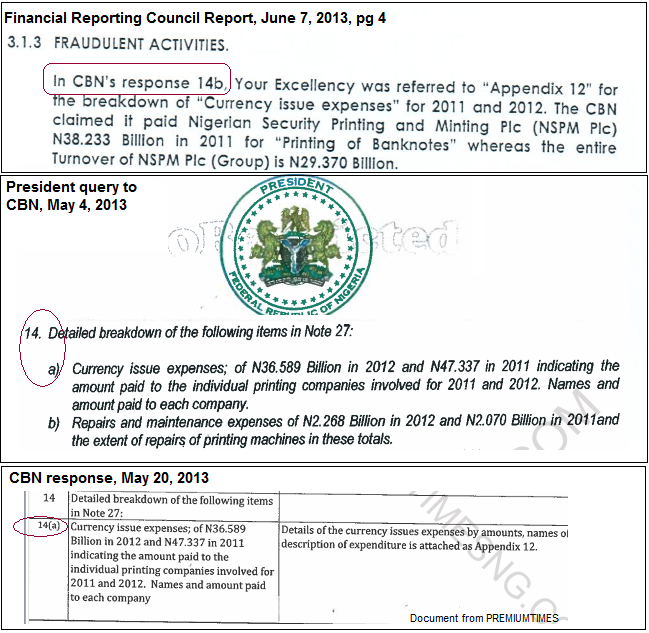Nonsense in the Financial Reporting Council Report on the CBN
Peregrino Brimah
Nigeria’s ministries, ministers and law makers are the highest paid in the entire world. Equipment purchases and renovations for these departments run into billions with computers purchased at triple global prices and then ‘replaced’ again with each year’s budget.
In view of the above, the errors in the Financial Reporting Council report used to ‘fire’ CBN governor, Sanusi Lamido Sanusi are very significant, distressing and call into question the entire processes of this particular case and all cases covered by this council.
The error pointed out below also calls into question the value of the secretary of the President, his advisers and all related officials who this document passed through.
Finally, this error further challenges the validity and legality of the President’s action in firing the CBN governor which was pinged wholly on the ‘facts’ presented in the F.R.C. report in review.
The F.R.C. report was prepared by the Federal Ministry of Trade and Investment headed by Minister Olusegun Aganga, who according to an article of January 6, 2014 by Steve Omanufeme, in ThisDay, was tipped for Sanusi Lamido’s job.
In the report, ref: PRES/188/T&I/89—as downloaded online—a major issue which questioned the activity of the Central Bank was item 3.1.3 on page 4: FRAUDULENT ACTIVITIES.
In this item, the F.R.C. stated, “In CBN’s response 14b, your Excellency was referred to ‘Appendix 12’ for the breakdown of ‘Currency issue expenses’ for 2011 and 2012. The CBN claimed it paid Nigerian Security Printing and Minting Plc (NSPM Plc) N38.233 Billion in 2011 for ‘Printing of Banknotes’ whereas the entire Turnover of NSPM Plc (Group) is N29.370 Billion.”
This was a serious error that arguably threw out the validity of this report as presently prepared.
Item 14b in the President’s query to the CBN and item 14b in the CBN response did not pertain to “Currency issue expenses” as stated by the FRC, but rather to “repairs and maintenance expenses of N2.268 Billion in 2012 and N2.070 Billion in 2011.”
It was item 14a in the President’s query and item 14a in the CBN response that referred to the N38.23 Billion MINT expenditure claim of 2011. CBN document ref: GVD/GOV/STH/CON/03/, responded to item 14a as quoted: “Details of the currency expenses by amounts, names of suppliers as well as description of expenditure is attached as Appendix 12.”
Importantly also, the report failed to simply confirm and present exactly how much of the queried N38.23 billion was actually paid by the CBN to NSPM MINT. This is a very important detail left out in the seemingly hurriedly prepared report. The report also failed to mention if currency was printed by any external printers. These question that were unanswered and the grave error misplacing item 14a for item 14b cast doubt as to the legitimacy of this report.
Nigerians will be happy for such detailed audits of all executives, ministries and federal appointees. The level of detail in this report is well appreciated, however the nation requests all other departments be promptly audited and the findings made available to the public as has been in this case. But that noted, this inaccuracy calls into question the capacity of our government as presently constituted to properly audit its officials. It certainly justifies Nigeria’s Minister of Finance’s request for Forensic auditors in the ‘fraud’ case of the missing $20+ billion.
It is infrequently that the public has this unprecedented access to review the work of our highly paid ministries. This case reveals a high level of tolerated incompetence that passes several stages of review, is submitted from one ministry to the Presidency and is accepted with “nonsense” errors by the Presidency and acted upon to the risk of the nation’s economy. This error is significant. Such misplacements of items and figures are potentially fraudulent. This was a high caliber audit of Nigeria’s Apex bank, not a local bank audit. One needs to consider the utility of such “errors,” successfully passing several departments and resulting in the defrauding of the nation to the tune of billions.
It is important this report is revised to address the issues raised. It is also necessary looking forward, that there is some form of quality control in Nigeria’s government offices to check for this type of embarrassing and potentially dangerous conduct and performance of officials and departments who are compensated more than enough to perform at much higher standards.


